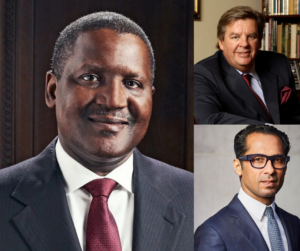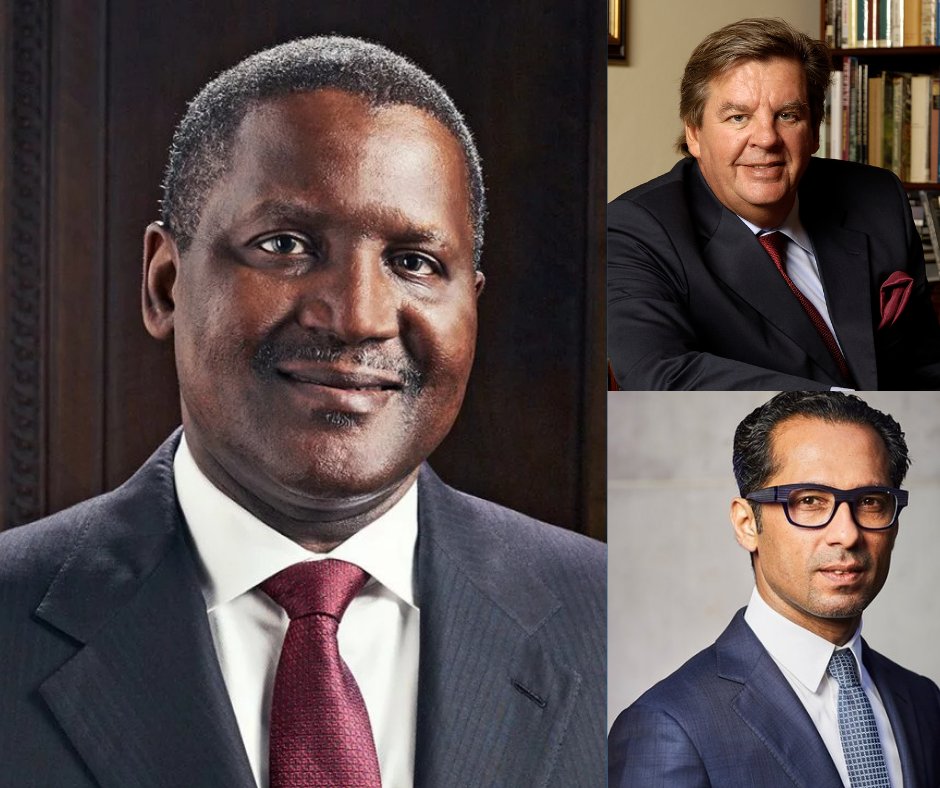By Issa Mbwana
The year 2024 has been a landmark for African billionaires, showcasing not only their financial resilience but also their far-reaching influence across diverse industries. From manufacturing and mining to telecom and fashion, Africa’s wealthiest are navigating complex economic landscapes and emerging as powerful forces shaping the continent’s future. As we delve into the wealth standings and industries of these individuals, a picture emerges that highlights not only their fiscal prowess but also their strategic moves across various sectors, setting new paradigms for wealth creation on the continent.
Top Wealth Leaders of Africa in 2024
- Aliko Dangote – $13.9 Billion (Manufacturing)
Nigeria’s Aliko Dangote continues to dominate as Africa’s wealthiest, capitalizing on his manufacturing empire, particularly in cement production, where he has a market-leading presence. His company, Dangote Cement, remains a cornerstone of his wealth, even as he explores expansion into petrochemicals and fertilizers. Dangote’s strategic investments reflect his commitment to broadening his manufacturing scope, underscoring his unwavering influence in Africa’s industrial sector. - Johann Rupert & Family – $10.1 Billion (Fashion & Retail)
South Africa’s Rupert has maintained a prominent position through his luxury brands under Richemont, including Cartier and Montblanc. Despite economic slowdowns in some markets, demand for luxury goods persists, with Rupert steering Richemont through innovations in online retail, effectively capturing a digitally engaged global customer base. - Nicky Oppenheimer & Family – $9.4 Billion (Metals & Mining)
The Oppenheimer name is synonymous with diamonds, and while the family divested from De Beers years ago, their investments in mining remain strong. The Oppenheimer family’s strategic reinvestment into diversified mining assets signals a pivot towards sustainable mining, aligning with global demand for ethically sourced minerals. - Nassef Sawiris – $8.7 Billion (Construction & Engineering)
Egyptian billionaire Nassef Sawiris has seen his wealth flourish due to significant stakes in OCI, a global leader in nitrogen fertilizer production. His investments in construction materials and partnerships with high-growth markets reinforce his critical role in regional infrastructure development. - Mike Adenuga – $6.9 Billion (Diversified)
Known for his telecom giant Globacom, Adenuga’s wealth spans multiple sectors, including oil production and real estate. Despite market competition, his investments in broadband technology have strengthened his telecom brand, capturing vast swathes of the African digital market. - Abdulsamad Rabiu – $5.9 Billion (Diversified)
Rabiu’s rise in wealth, primarily from cement production, highlights his strategic alignment with Nigeria’s infrastructure demands. His BUA Group has also expanded into agriculture and food production, supporting local economies and demonstrating his commitment to economic development.
Key Insights on African Billionaires’ Strategies and Market Trends
1. Shift Toward Diversification
Africa’s billionaires are diversifying portfolios, entering sectors like finance, real estate, and even entertainment, as seen with Koos Bekker and Mohamed Mansour. Diversification has not only buffered them against sector-specific downturns but has also created new revenue streams that fuel their growth ambitions.
2. Emphasis on Digital Transformation
Leaders like Strive Masiyiwa and Koos Bekker have emphasized digital transformation, particularly in telecom and media. These investments are paving the way for a connected Africa, bridging gaps in digital access, and providing new opportunities in technology-driven economies.
3. Infrastructure and Industrial Expansion
Infrastructure and industry have become focal points, with investments from Dangote, Sawiris, and Rabiu fueling essential sectors. This expansion aligns with Africa’s urbanization trends, catering to rising demands for construction materials, energy, and other resources.
4. The Emergence of Ethical and Sustainable Investments
The focus on sustainability is increasingly visible, especially in mining and manufacturing sectors. The Oppenheimer family, for example, has shown a commitment to sustainable practices in mining, setting an example for other industrial magnates.
The Tanzanian Influence: Mohammed Dewji’s Continued Rise
Notably, Tanzania’s own Mohammed Dewji remains one of East Africa’s wealthiest, with a net worth of $1.8 billion. Dewji, through MeTL, has championed industries such as textiles, food, and agriculture, creating thousands of jobs and advancing Tanzania’s economic landscape. His approach exemplifies a focus on local production, contributing to Tanzania’s self-sufficiency in consumer goods and underscoring his role as a critical player in the East African economic sphere.
Conclusion: What Lies Ahead for Africa’s Billionaires?
As 2024 draws to a close, Africa’s wealth leaders continue to navigate unique challenges and opportunities. The coming years will likely see increased collaboration with government entities, further integration of sustainable practices, and a continued push into digital transformation. These billionaires represent a powerful force in shaping Africa’s economic narrative, setting a foundation that could lead the continent to unprecedented economic heights in the coming decade.
Their strategies underscore a broader lesson in resilience, adaptability, and innovation – traits that have secured their status as Africa’s titans of wealth.



